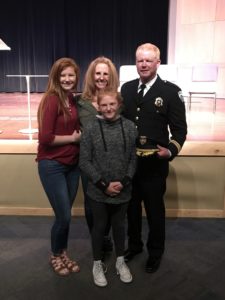Assistant Chief Kevin Cronin, an 18-year member of the Fort Collins Police Department, grew up in a blue-collar, Irish family in Boston, Massachusetts. A whim and a recommendation from a friend encouraged him to head west to Fort Collins, where he was told there were wide open spaces, beautiful mountains and plenty of fly fishing.
He arrived in 1992, found the city a good fit, and began taking classes to finish his bachelor’s degree. Cronin decided to pursue sociology as a major because he believed it would teach him methods to gather information and look more objectively at society.
 “Sociology changed my worldview,” Cronin says. “It’s part of my filter. It creates my perceptions and helps me make decisions. Higher education teaches you how to think through different lenses.”
“Sociology changed my worldview,” Cronin says. “It’s part of my filter. It creates my perceptions and helps me make decisions. Higher education teaches you how to think through different lenses.”
While Cronin was in school, he was a counselor for kids with drug and alcohol issues. “I was talking to Dr. Pete Taylor about rituals and what keeps families intact, like Sunday dinners,” he says. “I saw the deterioration of family rituals in the ’90s and the negative side effects in youth. I wanted to study rituals in society and thought the best route was from a sociological perspective.”
‘Attuned and very engaged’
“Dr. Pete Taylor was very attuned and very engaged. He was the kind of professor who would have conversations with me after class, and ask me to tell him how or what we learned in class applies to my life today. He really connected the content to the experience,” says Cronin.
Cronin was headed toward a Ph.D. when he decided to go back into law enforcement (which he had done in Massachusetts). He tested with the Fort Collins Police Department, and “I knew right away that’s where I belonged. It’s a job of service – you have to have a service mentality,” he says.
And that service mentality infuses Cronin’s new role as assistant chief of the Patrol Division, where he oversees 200 employees in the uniform division, including the Traffic Unit, Neighborhood Enforcement Team, SWAT, K-9 Unit and Bomb Squad, among others. And his job, which is 12 to 16 hours a day, six to seven days a week, is to “ensure that the mission of Police Services is successful every day,” he says. “That we provide professional and compassionate police services.”
And to accomplish that mission, Cronin and the other leaders at the police department have invested in pillar five of President Barack Obama’s President’s Task Force on 21st Century Policing: training and education. “We’re one of the few organizations in the U.S. that have 10 hours of dedicated training per month for our employees,” Cronin says. “Ninety percent of our officers feel positive about and supported by our community members, and that’s directly correlated to training. Training provides connectivity, understanding, and the outcome is professional and compassionate police services.”
Broader perspective
That philosophy about and the value given to training and education is a direct result of Cronin’s experience at CSU. “The value for the citizens of Fort Collins is that the law enforcement employee sustains a broader perspective, is thinking of innovative ways to problem-solve, and has service-industry peers to benchmark with across the nation. In our organizational culture, officers are always evolving and always changing to meet the needs of our community,” says Cronin.
And to meet the needs of the community, he and other members of leadership are identifying those needs and increasing engagement between police and the community through a format called Procedural Justice: 1. Employees/citizens have a voice. 2. The officer is impartial. 3. The officer is fair. 4. The officer is transparent – and people understand why he/she made the decision he/she did.
“The community wants to know more, and wants to be more involved,” he says. “One of the things we’ll see in five years is that we as citizens will become more involved in our neighborhoods, our governments, our faith-based organizations. People are moving toward a mantra, ‘how can I be a part of that.’”
And he encourages any citizen who is interested in getting a perspective on an officer’s worldview to participate in a ride-along or the citizen’s academy. “Everyone who’s participated has come away with a new perspective.”
For Cronin himself, he’s constantly looking at group needs. “When approaching problems, I’m always looking at groups: how they formed, what their needs are, how it’s a continually growing organism, and how can we can serve this group best.”
And that approach, which was developed in his sociology curriculum, informs his career outlook and success: “Fort Collins is an amazing community. I want to come to work with as much energy as possible to make this an even better place to live.”
This story originally appeared in the College of Liberal Arts Magazine.